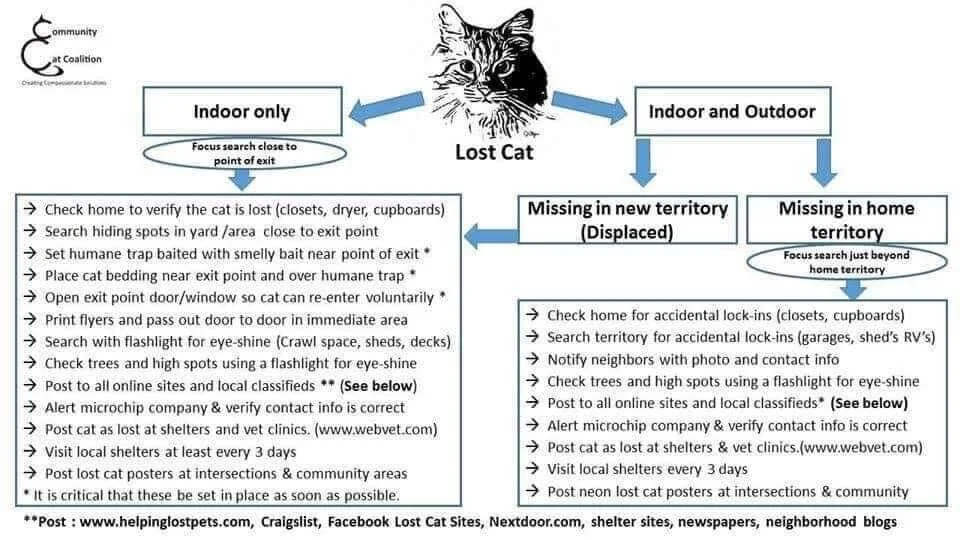What if your cat is lost?
What do you do if your cat gets lost? For indoor only cats, they are often very scared being outside and will stay close to the point of exit. Check around the exterior of your house, see if there are any holes where they could get underneath the house. Also check in the nearby bushes, under the stairs, under the patio or deck. They will often search out a dark place where they feel safe. Use a flashlight so you can see their eyes glow as you look into the dark spaces around your house. Cats are also climbers, so don’t forget to look up in the nearby trees. If your cat is missing and you did not see them escape, also check inside your home as he/she could have gotten scared by a loud noise and is hiding inside your house or may have gotten locked in a cabinet or closet. For an indoor - outdoor cat, also check to make sure he/she was not locked in a garage or shed. Check everywhere!
Cats do not like change and will often get scared in new environments or by loud noises and will hide. Often when an indoor-only cats gets out they will only come out of their hiding spot at night when they feel safer. For indoor - outdoor cats, they are more comfortable being outside and will often wander farther away from home. So when looking for an indoor - outdoor cat, expand your search throughout the neighborhood.
Place their dirty litter box and a dirty piece of clothing from their favorite family member outside and near the point of exit. This will help them find their way back home with familiar scents. Also put out thier favorite food, the smellier the better, and water (away from the litterbox) for when they get hungry they may come out to eat. When they are scared, most cats in strange environments will only come out at night to eat when they feel safe. If needed, you can also set up a humane trap containing their favorite food and covered with their bedding.
You also want to notify the vet clinics and shelters in case someone picks up your pet. Visit the shelters and vet clinics at least every three days to make sure your cat has not been found and brought to the shelter. Don’t rely on just calling as the person that answers the phone may be unaware of all the animals (especially new animals) in the shelter.
Notify all your neighbors as well, so they are on the look-out and can notify you if he/she is spotted. Pass out flyers to all your neighbors and post at the intersections of the streets and in community areas. Use a good color photo of your lost cat on the flyer along with your telephone number. If your pet has a microchip, contact the microchip company and make sure your information is up-to-date. Many people move or change phone numbers and forget to update the microchip information. Also post information about your lost furbaby online Pawboost, Nextdoor, and any of your community lost animal Facebook sites for the best chances of retrieving your missing furbaby.
To have the best chances of recovering your lost cat, it is important to take these steps as quickly as possible.
